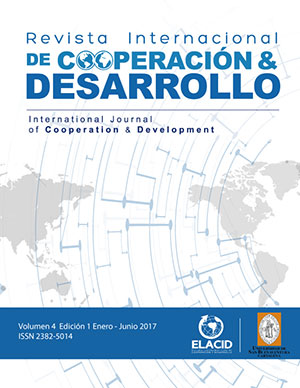INTERNATIONAL JOURNAL OF COOPERATION AND DEVELOPMENT
Assignment of Rights
Authorization for reproduction, publication, communication and distribution of a literary, artistic or scientific
Work.
I , ____________________________________________, author of the book and / or article , of legal age , resident of the city of _________________ , identified with citizenship / passport n° ______________________ issued on _______________________, in exercise of his physical and mental faculties , part henceforth be called the AUTHOR , supports the following authorization to the reproduction, publication, communication and distribution of a work, perform the following terms:
1. Regardless of current legal regulations due to the linking of the parties to this contract, and any kind of legal presumption , the parties agree that the AUTHOR authorize ( name of the publisher ) to reproduce , publish , communicate and distribute the material referred to in the International Journal of Cooperation and Development of the University of San Buenaventura.
2. Such authorization lies in particular on the copyright of the work, by any means known or unknown, publication of the work, distribution of the work , either directly or through third parties for purely educational purposes.
3. AUTHOR agrees to report and declare the existence of this authorization and to preserve the right of the International Journal of Cooperation and Development of the first publication of the work.
4. AUTHOR declares that the article is original and that it is his sole creation, no impediment of any kind exist for the authorization he is doing, besides being responsible for any action claim, plagiarism or other type of claim that might arise about .
5. Such permission is free of charge.
6. Moral copyright in the article are solely the AUTHOR and the University of San Buenaventura expressly agrees to recognize and respect them rigorously.
The Author and / or AUTHORS
SIGNATURE
Abstract
Al adoptar la Agenda 2030 y sus Objetivos de Desarrollo Sostenible los Estados asumieron la necesidad de superar las estructuras de trabajo en compartimentos estancos para poder cumplir los compromisos allí asumidos. Este trabajo pretende analizar la posibilidad real de pasar de un esquema de implementación en el que el pensamiento fragmentado dé lugar a la transversalidad. Para ello se realiza un estudio cualitativo basado en el enfoque decolonial sobre la forma en que se construyó la lógica de pensamiento fragmentado como parte de la modernidad, para luego analizar la institucionalidad estatal creada por Argentina, Colombia y Chile orientada a implementar la Agenda 2030 desde la óptica de la transversalización de visiones. La conclusión principal es que estamos aún lejos de poder trabajar en esquemas verdaderamente integrados y que, para hacerlo, el cambio debería ser realmente de fondo y transformacional.
References
Bunge, M. (2013). La ciencia: su método y su filosofía. Pamplona, España: Laetoni.
Consejo Nacional de Coordinación de Políticas Sociales. (2016). Guía para el proceso de adaptación de los ODS en el gobierno Provincial. Recuperado de http://www.politicassociales.gob.ar/public/documentos/seccion_publicaciones/publicacion2016-11-24-112150.pdf (14/02/2017).
De Sousa, B. (2009). Una epistemología del Sur, CLACSO Ediciones-Siglo XXI.
Dussel, E. (2015). Filosofías del Sur. Descolonización y Transmodernidad. México D.F.: Akal.
Escobar, A. (2012). El desarrollo y la antropología de la modernidad. En: Beatriz, Pérez. (Ed.). Antropología y desarrollo. Discurso, prácticas y actores. (pp.72-91). Madrid, España: IUDC-La Catarata.
Jones, B. (Ed.) (2006). Decolonizing International Relations. Rowman and Littlefield Publishers: Lanham.
_________ (2008). Race in the Ontology of International Order. Political Studies. (56), pp. 907-927.
Lander, E. (2011). La colonialidad del saber. Buenos Aires, Argentina: CLACSO.
Le Blanc, D. (2015). Towards integration at last? The sustainable development goals as a network of targets. Recuperado de http://www.un.org/esa/desa/papers/2015/wp141_2015.pdf (21/02/2016).
Llistar, D. (2009). Anticooperación. Interferencias Norte-Sur. Los problemas del Sur Global no se resuelven con más ayuda internacional. Madrid, España: Icaria.
Maldonado, N. (2007). Sobre la colonialidad del ser: contribuciones al desarrollo de un concepto. En: S, Castro., y R, Grosfoguel. (Eds.). El giro decolonial. Reflexiones para una diversidad epistémica más allá del capitalismo global (). Bogotá, Colombia: Siglo del Hombre Editores-Universidad Central.
Mignolo, W. (2001). Local History and global designs. An interview with Walter Mignolo. Discourse, 2(3), 7-33.
Millán, N., Santander, G., Aguirre, P., Garrido, A. (2012). La coherencia de políticas para el desarrollo en España. Mecanismos, actores y procesos. Madrid, España. Editorial 2015 y más.
Mohamed, A. (2015). Declaración a medios - Amina Mohammed, Asesora Especial del Secretario General para la Planeación de la Agenda para el desarrollo post 2015. Recuperado de http://www.co.undp.org/content/colombia/es/home/presscenter/articles/2015/02/18/declaraci-n-a-medios-amina-mohammed-asesora-especial-del-secretario-general-para-la-planeaci-n-de-la-agenda-para-el-desarrollo-post-2015/
O’Connor, D., Mackie, J., Van Esveld, D., Kim, H., Scholz, I. & Weitz, N. (2016). Universality, integration, and policy coherence for sustainable development: Early SDG implementation in selected OECD countries. Washington D.C, EE.UU.: Working Paper, World Resources Institute.
OCDE. (2016). Better policies for sustainable development 2016: A new framework for policy coherence. Paris: OECD Publishing.
Quijano, A. (2000). Colonialidad del poder y clasificación social. Journal of World-Systems Research, 6(2), 342-386.
_________ (2007). La colonialidad del poder y la clasificación social. En Castro, S. y Grosfoguel, R. (Eds.). El giro decolonial. Reflexiones para una diversidad epistémica más allá del capitalismo global (93-126). Bogotá, Colombia: Siglo del Hombre Editores-Universidad Central-Instituto de Estudios Sociales Contemporáneos-Pontificia Universidad Javeriana.
Sabaratnam, M. (2011). International Relations in dialogue… But can we change the subjects? A typology of Decolonising Strategies for the study of World Politics. Millennium: Journal of International Studies, 39(3), 781-803.
El Espectador (2015). Santos firma decreto que crea Comisión para Agenda de Desarrollo Post 2015. Recuperado de http://www.elespectador.com/noticias/economia/santos-firma-decreto-crea-comision-agenda-de-desarrollo-articulo-544902
Verschaeve, J., Delputte, S. & Orbie, J. (2016). The Rise of Policy Coherence for Development: A Multi-Causal Approach. The European Journal of Development Research, 28(1), 44-61.















